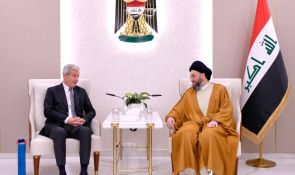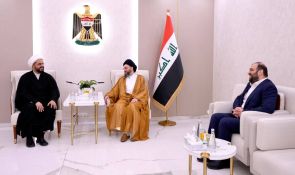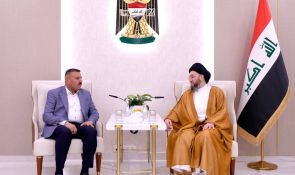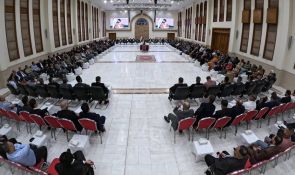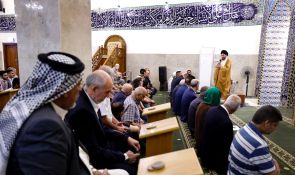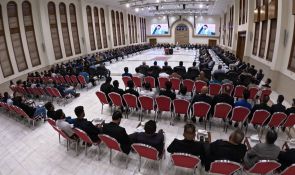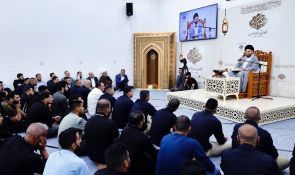SAYYID AMMAR AL-HAKIM: “Justice must be present in understanding liberties and enabling people to achieve their rights provided it is done fairly and according to restrictions enforced on everyone.”
Our talk during the past weeks was about the Islamic theory of leadership and administration. We stated that the covenant of the Commander of the Faithful (Ú) to Malik al-Ashtar, upon appointing him governor of Egypt, a sum-up of this theory. We also stated that the leadership network is not meant to be leaders of the nation and people only, who the king, president, minister or the like is. Rather, it extends to cover all leadership levels up to the family when it is lead by the father, when it is administered by an individual, the husband, up to arriving at such high levels. At any rate, the characteristics must be present in every official no matter what his responsibility may be, according to the Islamic viewpoint.
We reached the seventh of the covenant’s section which starts with the Commander of the Faithful (Ú) saying, “Let the matters you love the most be what is the most right, what is the most general in equity, and incorporate them all for the pleasure of the subjects.”
We completed the sixth section which discusses favoritism and injustice. Here, the Commander of the Faithful (Ú) talks about the importance of the polarity of the people and nation in administration and leadership: the political elite, the aristocratic status, special interest peoples…, all these must not be pivotal in their pleasure or displeasure with the official’s performance. Rather, it should be the public: What they want, the nation, what it wants. The Commander of the Faithful (Ú) started in putting the basic criteria and principles that achieve success…
He (Ú) mentions three principles: The FIRST principle is the status of moderation in seeking what is right and in the right stances. The SECOND principle is justice and its generalizing in all norms of conduct and stances which one who is in the position of responsibility needs. The THIRD principle is that this stance must be closer to the pleasure of everyone out of concern for the people’s conditions, the people for whom he is responsible when he issues instructions and adopts stances. This is a basic principle in achieving success, and we must stop at these three principles in order to provide some details:
FIRST: Mid-grounds in truth…, the sequences, restrictions, frameworks and bases will lead to a state of looseness, to a sense of exaggerated pleasure, an unrealistic sense, so we may reach the status of the shock: Man will find himself before a picture drawn for him; this is what tyrants do. In the hardest matters and circumstances, you hear a tyrant talking as if about a corpse. He talks about the achievements, the projects, etc. but where does this talk stand?! People do not see such achievements. So, the status of looseness, of exaggeration, or abandoning the middle grounds in any direction means being excessive or taking matters lightly which will lead to wasting the administrative and leadership network while planning, in policies, projects, and in making statements and undertaking measures. In all of these areas, what is right must be followed, the path of moderation and of middle grounds must be adopted so the utmost cases of success are achieved for the leadership network. This is Islam’s viewpoint as indicated by Ali (Ú): The level and the success criterion of any leader or official is gauged according to his adherence to the middle grounds, to what is right, in his overall behavior, performance and positions which he adopts in various fields.
Ali (Ú) says the following in Maxim 90 of Nahjul-Balagha: “The faqih (jurist), all of him, is one who does not cause people to lose hope of Allah’s mercy.” It is not just confinement to stating only the strict Shari`a-imposed ruling, to saying that this is permissible and this is prohibitive, this is contemptible, this is not allowed…, for this puts definitive things before people. When you interpret the Qur’an, you go to the verses that refer to the fire, to the wrath, and to retribution, which you explain, as if Islam and life are nothing but this aspect. This causes people to feel hopeless, despondent, and people by nature make mistakes. When you bring about this vision, or this aspect of the truth by itself, there will be imbalance, and there will be a serious sense of despair: “… Those who do not lose hope of Allah’s ease…” The truth faqih is one who does not cast despair of Allah’s mercy into people’s hearts. He puts an image before them that the fire is imminent. When one feels that he has become one of the inmates of the fire, what incentive would he have towards obedience, movement, life and achievement? He will lose them all!
This is on one hand.
On the other hand, the faqih, all of him, is one who does not offer them security from Allah’s plans. When interpreting the Qur’an, he goes to the verses that talk about Paradise, divine mercy, leniency in the Shari`a and towards easy stances, that Allah is ever-Forgiving, most Merciful, thus encouraging one to go to extremes in his wrong deeds so long as the gates of the divine mercy are wide open. Going to excesses and to indifference are both wrong; they both represent a portion of the truth. The integrated truth is one in which there are worries, penalties, restrictions, just as there are in it scopes, hopes, opportunities and the like. Matters must be submitted in a balanced way. This aspect of the Shari`a-mandated fiqh of life and the leadership network represent an example of administering this life which must depend on the status of middle grounds.
The Commander of the Faithful Ali (Ú) says the following in one of his sermons: “If one adopts moderation, they will safeguard his path and give him the glad tiding of salvation.” One who adopts moderation, who holds the stick from the middle, who works rightly adopting middle grounds, subjectivity and reality, will win praise and appreciation. People will feel at east about his program. They will depend on this program and tread on its path. The leadership network succeeds when it adopts middle grounds, when right is followed but while adopting middle grounds and taking circumstances into consideration. “One who takes to the right and to the left will have his way held in contempt, and they will warn him of perdition.” Therefore, abandoning moderation is going to perdition. It is exposing the leaders, their network, and the people of whom they take charge to potholes, to serious paths of peril. Nobody will be saved except through moderation, through going towards the right that considers people’s subjective circumstances, those towards whom we bear the responsibility.
The SECOND principle: Justice and generality of justice… It does not suffice for you to be just with some while giving exceptions to your own group and those related to you. This violates the generality of justice as the Commander of the Faithful (Ú) says: “… and generalize it in justice.” Justice must be in everything: just liberties; tightening the noose round some people while being lenient with others is not just and it does not achieve success for the leadership network. Justice must be present in understanding liberties, in identifying and promoting these liberties, in enabling people to attain their right to liberty but with justice and with restrictions that are applied to everyone without any exception.
Adherence to the law is also generalizing justice. The law is there for all citizens, but senior officials and the elite from among people, those who have others to intercede on their behalf, their middlemen, are the exception to it. The law must be applied ver batim; otherwise, success is not achieved for the leadership network.
When the father is not fair in distributing the rights among his sons, he loses respect for him in the family. The tribe’s sheikh will have no value for him in the tribe when he is not just. The same applies to all leadership networks.
Justice in granting concessions… There must be no class system, nor should there be a gap among people. Everyone must win according to his ability, energy and position, everyone according to his qualifications, opportunities, role and responsibility vested on him. But one who has the same qualifications and under the same circumstances is given, whereas another is not; this is injustice.
Justice in rights, concessions and possessions… There must be justice when it comes to possessions. This minister was given 600 square meters of land on the Tigris shore. That ordinary citizen does not have an inch of land. This official was given a place in the desert. This manager was given a suitable place in the heart of the city. This is not justice in the distribution of opportunities. Applying justice in awarding concessions and possessions is the right entrance towards the success of the leadership network. Let us tread the right paths so we may achieve the entitlements and the right outcomes. Wrong introductions do not lead to right results under any circumstance. If we want to mend our affairs, we must refer to this deep vision in administering the government and in leadership as is Islam’s viewpoint articulated by Imam Ali (Ú).
Justice in tasks and responsibilities; a competent, expert and able person is the one who should be granted responsibility. Whoever is the most competent and capable must have the best opportunity and the greatest to earn responsibility here and there.
Justice includes everyone… Generosity includes some.
Imam Ali (Ú) says the following in Maxim 437 of Nahjul-Balagha: The Imam (Ú) was asked about what is better, justice or generosity. He (Ú) said, “Justice places things in their right position, giving everyone what belongs to him. As for generosity, it is adding to it more than his entitlement. You give him. You are generous to him; so, he gets more than what he deserves for some reason.” Justice is a general policy: “Justice covers all: When there is fair distribution, everyone takes his share and chance. Generosity is a casual particularity. As for justice, it is the best of both of them, their choicest.” It is not right that I am generous so some people may live with their bloated stomachs while others are deprived. Justice is more fitting. But once justice is implemented, if there is an excess of wealth or good things, and if you want to give it to those who innovate, who are sincere, who care, there is no harm in it, but not at the expense of others. Be fair with everyone, then find one or more who deserves to be singled out for a particular distinction.
Success of the leadership network is achieved when everyone feels happy, comforted, and nobody feels that he is wronged…
On p. 30, Vol. 6, of Ghurar al-Hikam, Ali (Ú) is quoted as having said, “The perfection of happiness is the endeavor to reform the public.” How do we build a good nation? Patriotism, the rights and the culture of right patriotism, the success of the leadership network is when everyone feels happy, restful, comfortable, and when nobody feels that he is wronged. The feeling of being wronged leads to a reaction, and the reaction is faced by a reverse reaction that leads to entering a whirlpool that has neither beginning nor end. The feeling of everyone that he gets his chance, that he is at ease, is the one that achieves stability and ultimately success in the leadership network.
Justice according to Islam is one indivisible reality…
Justice, as Islam envisions it, is indivisible; it is one reality. Social justice cannot be achieved without achieving economic justice. How can there be social justice without a fair distribution of wealth to the people? Social and economic justice cannot be achieved without achieving political justice and without a sound distribution of roles. Also, social, economic and political justice cannot be achieved without achieving judicial justice: If you are just, you must be just in all these aspects. Justice is placing a thing in its right place. We plead to Allah Almighty to enable us to commit ourselves to these principles and to implement them.


